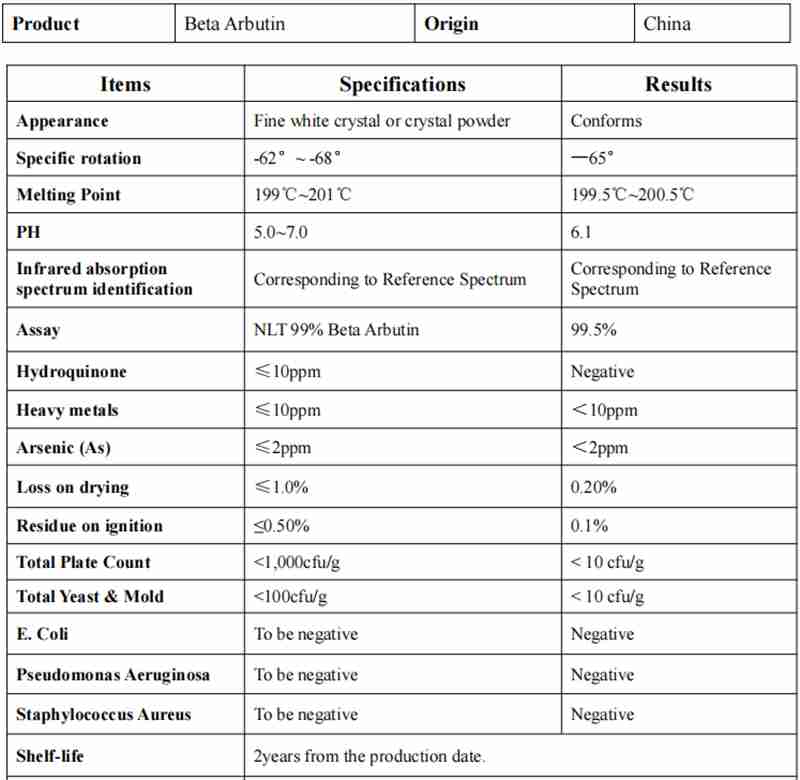T: +86-731-89865681
E: info@kingherbs.com
E: info@kingherbs.com
27Fl, Blding A, Cimen Fun City, Wanjiali Road, Changsha 410014, Hunan, China
| Availability: | |
|---|---|
| Quantity: | |
Description
Arbutin is widely praised as a mild skin whitening agent. It is suitable for most skin types and is often found in various skin care products.
When applied to the skin, arbutin is absorbed into the cells and acts as a melanin inhibitor. Arbutin effectively blocks the enzyme responsible for converting tyrosine into melanin (called tyrosinase). Because melanin is the pigment that gives skin its color. Too much melanin production can lead to dark spots, hyperpigmentation, uneven skin tone, and other pigment-related problems.


Function:
1. Inhibiting pigment;
2. Skin whitening;
3. Antiphlogosis;
Application:
1. For skin care products;
2. For burns and scalds ointment;
Description
Arbutin is widely praised as a mild skin whitening agent. It is suitable for most skin types and is often found in various skin care products.
When applied to the skin, arbutin is absorbed into the cells and acts as a melanin inhibitor. Arbutin effectively blocks the enzyme responsible for converting tyrosine into melanin (called tyrosinase). Because melanin is the pigment that gives skin its color. Too much melanin production can lead to dark spots, hyperpigmentation, uneven skin tone, and other pigment-related problems.


Function:
1. Inhibiting pigment;
2. Skin whitening;
3. Antiphlogosis;
Application:
1. For skin care products;
2. For burns and scalds ointment;
α-Arbutin, a naturally derived glycoside found in plants like bearberry and blueberry, has emerged as a gold standard in skincare for its exceptional skin-brightening and hyperpigmentation-reducing properties. Unlike its isomer β-arbutin, α-arbutin offers superior stability and efficacy, making it a preferred choice in cosmetic formulations.
Key Benefits
1. Hyperpigmentation Reduction:
α-Arbutin inhibits tyrosinase activity, the enzyme responsible for melanin production. By blocking melanin synthesis at the cellular level, it effectively fades dark spots, sunspots, and melasma, resulting in a more even skin tone.
2. Gentle and Safe:
Unlike harsh ingredients like hydroquinone, α-arbutin is non-irritating and suitable for all skin types, including sensitive skin. It decomposes into glucose and hydroquinone only under UV exposure, but its slow-release mechanism ensures minimal skin irritation.
3. Antioxidant Protection:
It neutralizes free radicals caused by UV radiation and pollution, preventing oxidative stress and premature aging. This dual action of brightening and protecting makes it ideal for daytime skincare routines.
4. Anti-Inflammatory Properties:
Studies show α-arbutin reduces redness and inflammation, aiding in the treatment of acne scars and post-inflammatory hyperpigmentation.
Clinical Backing
Research indicates that formulations with 2% α-arbutin significantly improve skin luminosity within 4–8 weeks. Its efficacy is further enhanced when paired with vitamin C or niacinamide, creating synergistic effects for radiant skin.
Applications
Widely used in serums, creams, and sunscreens, α-arbutin is also incorporated into medical-grade products for treating stubborn pigmentation. Its compatibility with other actives and stability under varying pH levels make it a versatile ingredient.
Conclusion
α-Arbutin stands out as a safe, science-backed solution for achieving brighter, healthier skin. Its natural origin, minimal side effects, and proven results align perfectly with the growing demand for clean, effective skincare—a true ally in the pursuit of timeless beauty.
α-Arbutin, a naturally derived glycoside found in plants like bearberry and blueberry, has emerged as a gold standard in skincare for its exceptional skin-brightening and hyperpigmentation-reducing properties. Unlike its isomer β-arbutin, α-arbutin offers superior stability and efficacy, making it a preferred choice in cosmetic formulations.
Key Benefits
1. Hyperpigmentation Reduction:
α-Arbutin inhibits tyrosinase activity, the enzyme responsible for melanin production. By blocking melanin synthesis at the cellular level, it effectively fades dark spots, sunspots, and melasma, resulting in a more even skin tone.
2. Gentle and Safe:
Unlike harsh ingredients like hydroquinone, α-arbutin is non-irritating and suitable for all skin types, including sensitive skin. It decomposes into glucose and hydroquinone only under UV exposure, but its slow-release mechanism ensures minimal skin irritation.
3. Antioxidant Protection:
It neutralizes free radicals caused by UV radiation and pollution, preventing oxidative stress and premature aging. This dual action of brightening and protecting makes it ideal for daytime skincare routines.
4. Anti-Inflammatory Properties:
Studies show α-arbutin reduces redness and inflammation, aiding in the treatment of acne scars and post-inflammatory hyperpigmentation.
Clinical Backing
Research indicates that formulations with 2% α-arbutin significantly improve skin luminosity within 4–8 weeks. Its efficacy is further enhanced when paired with vitamin C or niacinamide, creating synergistic effects for radiant skin.
Applications
Widely used in serums, creams, and sunscreens, α-arbutin is also incorporated into medical-grade products for treating stubborn pigmentation. Its compatibility with other actives and stability under varying pH levels make it a versatile ingredient.
Conclusion
α-Arbutin stands out as a safe, science-backed solution for achieving brighter, healthier skin. Its natural origin, minimal side effects, and proven results align perfectly with the growing demand for clean, effective skincare—a true ally in the pursuit of timeless beauty.